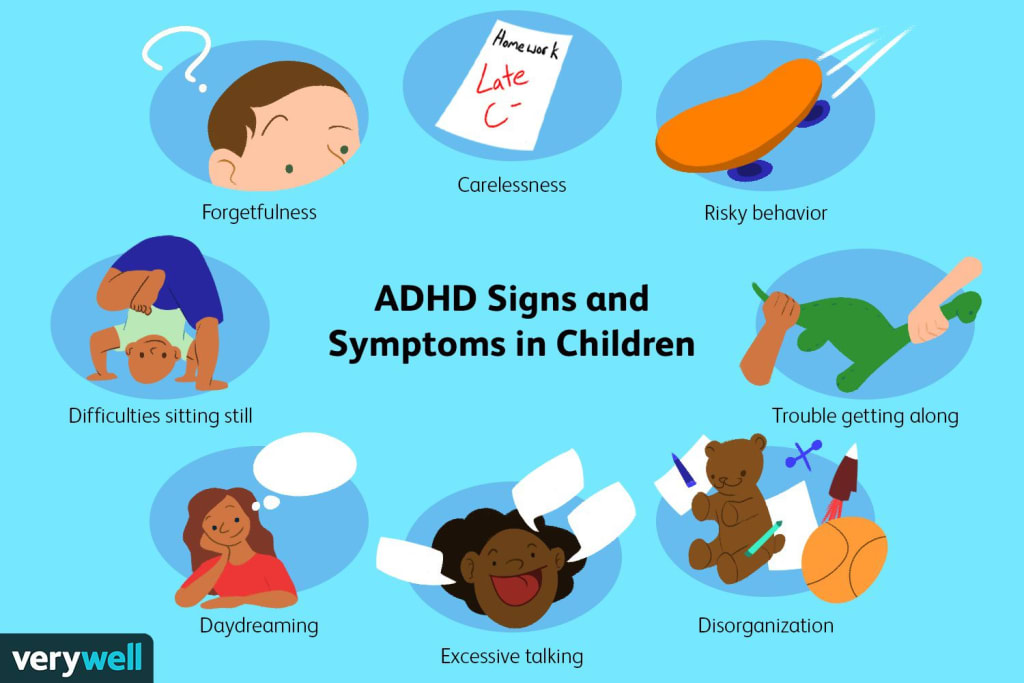The Link between ADHD and Other Mental Health Conditions
The Link between ADHD and Other Mental Health Conditions

Attention-deficit/hyperactivity disorder (ADHD) is a neurodevelopmental disorder that affects children and adults. It is characterized by a persistent pattern of inattention and/or hyperactivity-impulsivity that interferes with functioning or development. ADHD is a complex condition that often co-occurs with other mental health conditions.
According to the Diagnostic and Statistical Manual of Mental Disorders, Fifth Edition (DSM-5), ADHD can be diagnosed in individuals who exhibit six or more symptoms of inattention and/or hyperactivity-impulsivity for at least six months, with onset before age 12. Symptoms must be present in two or more settings and cause significant impairment in social, academic, or occupational functioning.
ADHD is a common condition, affecting approximately 5-10% of children and 2-5% of adults worldwide. The exact cause of ADHD is not known, but it is believed to be due to a combination of genetic, environmental, and neurological factors.
The Link between ADHD and Other Mental Health Conditions
ADHD is often comorbid with other mental health conditions. In fact, up to 75% of individuals with ADHD have at least one other mental health condition, such as anxiety, depression, oppositional defiant disorder (ODD), conduct disorder (CD), or substance use disorder (SUD).
Anxiety and ADHD
Anxiety disorders are the most common comorbidity in individuals with ADHD. Approximately 25-40% of individuals with ADHD also have an anxiety disorder. Symptoms of anxiety disorders, such as excessive worry, fear, and avoidance behaviors, can exacerbate symptoms of ADHD, such as inattention, impulsivity, and hyperactivity.
Depression and ADHD
Depression is another common comorbidity in individuals with ADHD. Approximately 20-30% of individuals with ADHD also have a depressive disorder. Symptoms of depression, such as low mood, apathy, and fatigue, can interfere with treatment for ADHD and decrease overall functioning.
ODD and CD and ADHD
Oppositional defiant disorder (ODD) and conduct disorder (CD) are two behavioral disorders that often co-occur with ADHD. ODD is characterized by a pattern of defiant, disobedient, and hostile behavior towards authority figures. CD is characterized by a pattern of antisocial behavior, such as aggression, theft, and vandalism.
Approximately 25-50% of children with ADHD also have ODD, and up to 20% have CD. These disorders can make it difficult for children to follow rules, comply with authority figures, and function in social and academic settings.
SUD and ADHD
Substance use disorder (SUD) is another common comorbidity in individuals with ADHD. Approximately 25-40% of individuals with ADHD also have SUD. ADHD symptoms can increase the risk of substance use and abuse, as individuals with ADHD may use substances to self-medicate or alleviate symptoms.
ADHD is a treatable condition, and early intervention is critical for improving outcomes. Treatment for ADHD typically involves a combination of medication, behavioral therapy, and lifestyle changes.
Medication
Stimulant medications, such as methylphenidate and amphetamine, are the most commonly prescribed medications for ADHD. These medications work by increasing levels of dopamine and norepinephrine in the brain, which can improve attention, impulse control, and hyperactivity.
Non-stimulant medications, such as atomoxetine and guanfacine, are also used to treat ADHD. These medications work by increasing levels of norepinephrine in the brain, which can improve attention and impulse control.
Behavioral Therapy
Behavioral therapy is another important component of treatment for ADHD. Behavioral therapy can help individuals with ADHD develop coping strategies, improve social skills, and manage symptoms. There are several types of behavioral therapy that are effective for ADHD, including:
Cognitive-behavioral therapy (CBT): CBT is a type of therapy that helps individuals identify and change negative thought patterns and behaviors. CBT can be particularly effective for individuals with ADHD who struggle with impulsivity and emotional regulation.
Parent training: Parent training involves teaching parents how to manage their child's behavior and provide consistent structure and boundaries. Parent training can be particularly effective for young children with ADHD.
Social skills training: Social skills training can help individuals with ADHD improve their communication, socialization, and problem-solving skills. Social skills training can be particularly effective for adolescents and adults with ADHD who struggle with social interactions.
Lifestyle Changes
Lifestyle changes can also be an important component of treatment for ADHD. Some lifestyle changes that may be helpful for individuals with ADHD include:
Exercise: Exercise has been shown to improve attention, mood, and overall functioning in individuals with ADHD.
Healthy diet: A healthy diet that is high in protein, fiber, and omega-3 fatty acids and low in sugar and processed foods may help improve symptoms of ADHD.
Sleep hygiene: Good sleep hygiene, including a regular sleep schedule and a relaxing bedtime routine, can help individuals with ADHD get the restful sleep they need to function well during the day.
About the Creator
Enjoyed the story? Support the Creator.
Subscribe for free to receive all their stories in your feed. You could also pledge your support or give them a one-off tip, letting them know you appreciate their work.





Comments
There are no comments for this story
Be the first to respond and start the conversation.